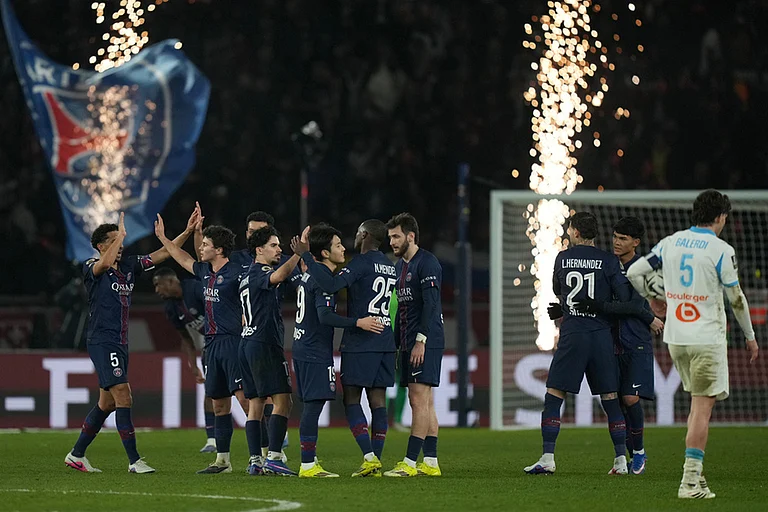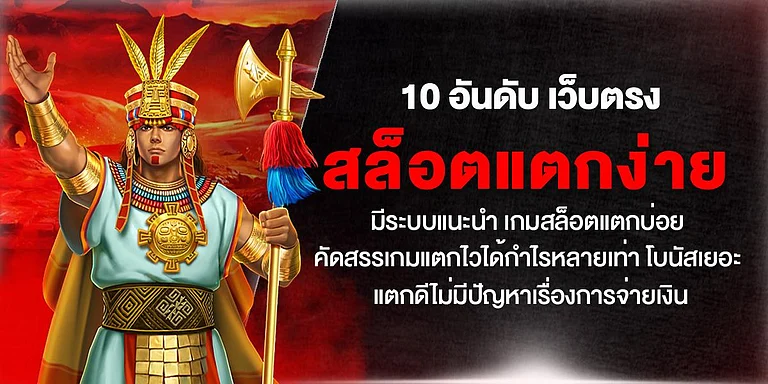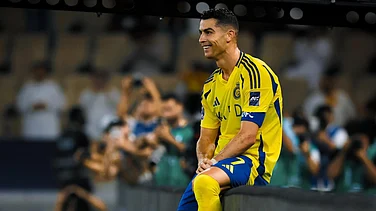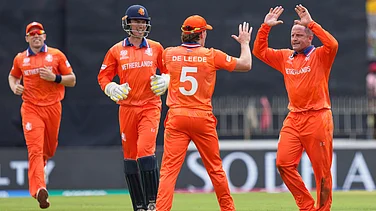In the trail of legends of Indian sports stars, the one about former national skipper V.P. Sathyan is that on his wedding night, the 27-year-old centre-back confessed to the bride that he had another love—and that even their marriage couldn’t stand in its way. The groom meant football, obviously, as an upset Anitha realised coyly in the next breath. One-and-a-half decades later, Anitha saw her husband doze off while watching a 2006 World Cup match on TV in their Chennai home. It was unusual, but she chose not to wake him up.
Sathyan hadn’t slept out of disinterest, it’s just that he had been depressed for a while and was under medication. On July 18, nine days after the FIFA final, he jumped in front of a moving train at the suburban Pallavaram station of his city. He was just 41.
The news of his suicide shocked the buffs of the game, more so in Sathyan’s native Kerala. A day later, a big crowd in upstate Malabar witnessed their hero being taken to the pyre. His ex-teammates grieved, volatile striker I.M. Vijayan was inconsolable. A great tackler of the ball had miserably failed in his grapple with life at large.

In Captain, Jayasurya plays the Indian skipper who took India 57 places up in the world ranking
Twelve years thence, Sathyan is back in public memory once more. A Malayalam film essaying his poignant, eventful life has hit theatres, earning warm reception (see review). Close followers of the footballer, whose leadership saw India bettering its world ranking to 99 from 156, feel that the biopic has been aptly titled: Captain.
Sathyan is perhaps most endearingly remembered for one of his early exploits in the game that fetched the national team a dramatic goal. All of 21 years in the 1986 Merdeka tournament in Kuala Lumpur, Malaysia, this linebacker’s 40-yard ranger to the net won India its do-or-die match against South Korea. Coach P.K. Banerjee’s gamble had finally borne fruit; it was he who had shifted Sathyan, a backie, to the defensive midfield from where he ‘scored like thunder’. Three months later, Sathyan was in the very country his team famously defeated—as part of the Indian contingent at the Seoul Asiad.
There were several other laurels along the way as well. To set the record straight, let’s go back to the beginning. Sathyan debuted for Kerala while still in his teens in 1983 at the Santosh Trophy. In 1985, he was in Dhaka to play the SAF Games. From then on, Sathyan was busy in the domestic circuit. In 1991, he took charge of the Indian national football team as captain. And a year later, he created a milestone for Kerala by winning it the Santosh Trophy after a drought of almost two decades. Packed between all these events was his stint at the Calcutta clubs. In 1995, the All India Football Federation (AIFF) declared him ‘player of the year’. Seven years thence, when India toured East Asia, Sathyan was assistant to his team’s coach Stephen Constantine, who the AIFF had brought from England. That was a year after Sathyan’s 1996-2001 tenure as a player for the Indian Bank, which later made him the team’s coach.
While the career graph shone bright, he was always dodging other problems running parallel to his career. Sathyan’s two seasons in Bengal, where he played for both Mohammedan Sporting and Mohun Bagan, weren’t his happiest. “It was with a lot of hope that he left (Kerala Police) for Calcutta in 1991, but his letters to me were despondent,” recalls Anitha. “I took a break from my MTech, joined him there. Foot injuries had already begun plaguing him.”
The internal conflict apart, Sathyan was gaining a name among that metro’s maidan football buffs. Veteran sports analyst Rupak Saha enthusiastically remembers his measured passes in the midfield, where coach Syed Naeemuddin had positioned him for Bagan. “Off action, he looked introverted,” says Saha. Sisir Ghosh, who then captained the team, found Sathyan a “thorough gentleman”. Adds ex-footballer Prasanta Banerjee: “You’d never spot him idle in the field.”

Yet, the Kannur-born player chose to withdraw to his home-state. The Kerala Police team took him for a second time. His colleague C.V. Pappachan notes that Sathyan typically did his job without fuss. “True, there were occasions where I had skirmishes with him, but there was no bad blood after the match,” says the player from Thrissur who is also a trained chenda percussionist. “In fact, soon after Sathyan joined Indian Bank, we played him. He was, as usual, a very tough stopper. Totally professional.”
In Chennai, Sabir Pasha, who represented India from 1993 to 2001, in a career that began with Indian Bank, notes that Sathyan would chide a teammate if his tackle was nasty. “When the team was not scoring, he’d come up at the right time, with a fierce force,” he adds. “But then, Sathyan would be so gentle to his fans, to the kids wanting a photo with him or getting an autograph.”
Many soccer buffs remember him as a shy star. “At the Maharaja’s College ground a quarter century ago,” recalls Ernakulam-raised Sooraj Vasudevan, “he virtually hung his head while giving us boys a handshake.” Not far from the venue is Mattanchery, where Sathyan had his equally unassuming coach, T.A. Jaffer. Sathyan had realised by then that footballers in India did not enjoy recognition, if at all there was any of it, for long. He had once seen Olympian footballer Jarnail Singh Dhillon running around to get a pass for a match during his retired life in Punjab, a friend points out.
Cheenai-based sportswriter S.R. Suryanarayan says he noticed Sathyan sensing his importance decreasing with time. “Towards his final years, it seemed Sathyan felt he had got all the moves wrong. He perhaps found his official designation (assistant manager) not matching his achievements,” he says
Former Kerala player Kurikesh Mathew, who captained the team when it won the Santosh Trophy for a second consecutive year in 1993, puts it bluntly: “Sathyan wouldn’t have faced any problem had he chosen to remain with Kerala.” Kurikesh, still with Kerala Police as a senior officer, says Sathyan wasn’t the kind of person who would keep mum about what he thought was unfair to himself or friends. “In places outside your homeland, you need to be diplomatic, suitably sincere. Sathyan was never loud, but he always called a spade a spade. That needn’t necessarily work to your benefit.”
Former India goalkeeper K.T. Chacko dubs Sathyan’s move to Bengal a case of poaching. “We were a very strong team those days,” he trails off to 1990 and ’91, when Kerala Police won the Federation Cup. “Other clubs wanted to weaken us.” Chacko remembers his meeting with Sathyan at a junior state football camp in 1985. “At my practice sessions under the bar, I used to face him. From the booming kicks that came from his foot, I knew this guy was going to make it big.”

Sathyan’s physique used to fascinate his Goan contemporary Bruno Coutinho. The “diminutive striker” from the Konkan coast says the Malayali’s sturdiness should have taken him to some foreign clubs. Sathyan did get a couple of offers too, but wasn’t sure of going abroad. “Anyway, those weren’t times when Indian football had agents,” points out Bruno, who played his farewell match at the Millennium Cup in 2001, the year he won the Arjuna award. “We were all youths with little exposure and practically none to guide us.”
Fellow Goan Savio Medeira, who has coached the India Under-23 team, says the new generation is getting less patient. “A coach is often a loner; a lot of calculations constantly circle inside his head—the best of which he has to get executed by the youngsters less than half his age,” notes the 52-year-old, who spent his entire 1983-2000 career with Salgaocar S.C. “You need to be tenacious...have the will power to not buckle under pressure,” he adds, throwing in the tacit hint at Sathyan’s final years.
“Sathyan least desired to sit in a bank cabin and keep accounts,” says his Kerala teammate U. Sharaf Ali, who, along with Vijayan, had his stints in Bengal football. “Sathyan was like an elder brother to me; it was with him that I stayed in Calcutta initially,” says Vijayan, known for his attacking partnership later with Bhaichung Bhutia. Thrissur’s Jo Paul Ancheri, who coaches in Calcutta today, is still in awe of Sathyan, his senior by 10 years. Sathyan tended to hide all worries, he adds.
That brooding streak, which many say stemmed from constant injuries and a thyroid disorder, was coupled with a bout of alcoholism. Sathyan overcame it much before his death, according to sources close to him. They dismiss rumours that he was into gambling, which led to penury.
Finally, comes the ode to the troubled veteran; a life-story that journalist Prajesh Sen found tailor-made for a movie. “Hence, Captain,” says the 38-year-old from Thiruvananthapuram, about his first directorial venture that has Jayasurya playing the lead. “I practised football for three months last summer to familiarise myself with not just the sport but Sathyan himself,” says the Kochiite actor. Anu Sithara, who dons the role of the footballer’s wife, says she benefited from the tips the real-life character, Anitha, offered her at locations.
Sathyan was a schoolmate of top athlete P.T. Usha, but it was much later at a sports camp outside Kerala that the two learned about the fact. Interestingly, while at school, Sathyan had excelled as an athlete, and took to football a little later. At the Kannur police grounds, local trainer K. Kunhiraman used to find a teenaged Sathyan practising alone, daily. It’s as if the sheer dedication had fallen into place before he found his true love, and calling—football. In many ways, Sathyan’s story also overlaps with the story of Indian football in that era, which, despite having its own eventful history, remained at the sidelines of national consciousness, its heroes left to fend for themselves in the world of mechanical realities outside the vibrant field of play.


























